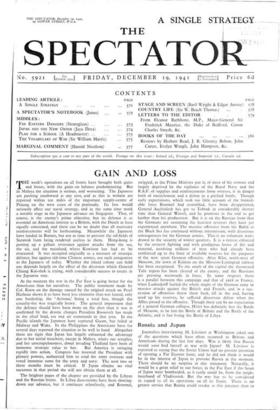GAIN AND LOSS
THE week's operations on all fronts have brought both gains and losses, with the gains on balance predominating. But in Malaya the situation is serious, and worsening. The Japanese are pushing southward at any cost, and as this is written are reported within ten miles of the important supply-centre of Penang on the west coast of the peninsula. Its loss would seriously affect our naval strategy, and at the same time mark a notable stage in the Japanese advance on Singapore. That, of course, is the enemy's prime objective, but its defence is as essential an American interest as a British, with the Dutch at least equally concerned, and there can be no doubt that all necessary reinforcements will be forthcoming. Meanwhile the Japanese have landed in Borneo, but not in time to prevent the oil-fields of Sarawak from being rendered useless to them. Hong-kong is putting up a gallant resistance against attacks from the sea, the air, and the mainland, where Kowloon has had to be evacuated. It was occupied originally as a measure of strategic defence, but against old-time Chinese armies, not such antagonists as the Japanese of today. Whether the island colony can hold out depends largely on the effect of the diversion which General Chiang Kai-shek is trying, with considerable success to create in the Japanese rear.
At the moment the war in the Far East is going better for the Americans than for ourselves. The public statement made by Col. Knox on the damage caused by the original attack on Pearl Harbour shows it to have been less extensive than was feared, only one battleship, the ' Arizona,' being a total loss, though the casualty-list was tragically heavy. The general impression that the defence should have been more on the alert than it was is confirmed by the drastic changes President Roosevelt has made in the chief land, sea and air commands in that area. In the Pacific islands the Japanese have captured Guam, but failed at Midway and Wake. In the Philippines the Americans have for several days reported the situation to be well in hand. Altogether there are signs that Japan has largely exhausted the advantage due to her initial treachery, except in Malaya, where our scruples, and her unscrupulousness, about invading Thailand have been of immense strategic value to her. But America is swinging rapidly into action. Congress has invested the President with plenary powers, authorised him to send the army overseas and voted immense sums for the army and navy. The next two or three months must be critical. If Japan obtains no vital successes in that period she will not obtain them at all.
The brighter pages of the chapter are provided by the Libyan and the Russian fronts. In Libya dust-storms have been slowing- down our advance, but it continues relentlessly, and Rommel, stripped, as the Prime Minister put it, of most of his armour and largely deprived by the vigilance of the Royal Navy and the R.A.F. of supplies and reinforcements from oversee, is in danger both of encirclement and a defeat in a pitched battle. Though early expectations, which took too little account of the formid- able force Rommel had assembled, have been disappointed, General Auchinleck has got to Tobruk in considerably shorter time than General Wavell, and he promises in the end to get further than his predecessor. But it is on the Russian front that the Germans are sustaining the heaviest reverses they have yet experienced anywhere. The massive offensive from the Baltic to the Black Sea has continued without intermission, with disastrous consequences for the German armies. This is no voluntary with- drawal to the security of winter quarters. It is a retreat enforced by the severest fighting and with prodigious losses of life and material, involving millions of men who had already been reinforced up to the limit of available reserves for the purposes of the now spent German offensive. After Klin, north-west of Moscow, the town of Kalinin on the Moscow-Leningrad railway has been recaptured. To the south of the capital the threatened Tula region has been cleared of the enemy, and the Russians are pressing westwards in force. In some respects there is a parallel between this campaign and that of 1918 in France, when Ludendorff hurled the whole might of the German army in massive attacks against the British and French, and in a suc- cession of offensives threw them back, till in the end, having used up his reserves, he suffered disastrous defeat when the Allies passed to the offensive. Though there can be no expectation of a general German collapse, Hitler has definitely lost the Battle of Moscow, as he lost the Battle of Britain and the Battle of the Atlantic, and is fast losing the Battle of Libya.






















